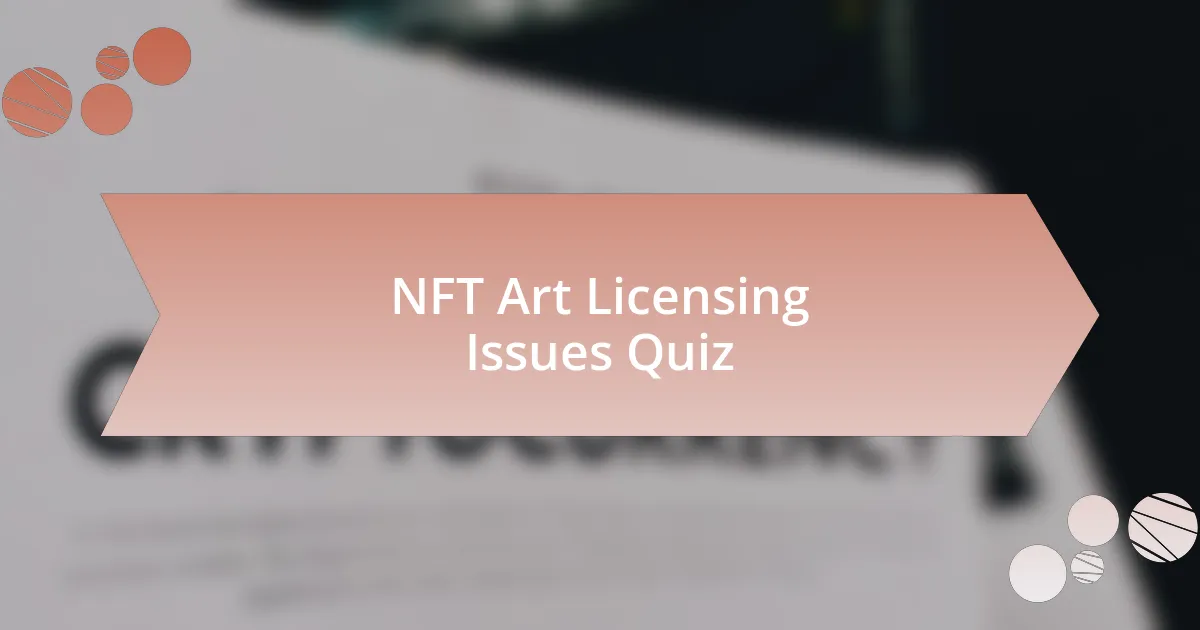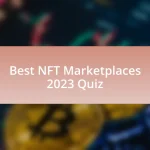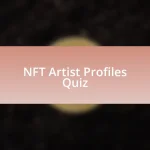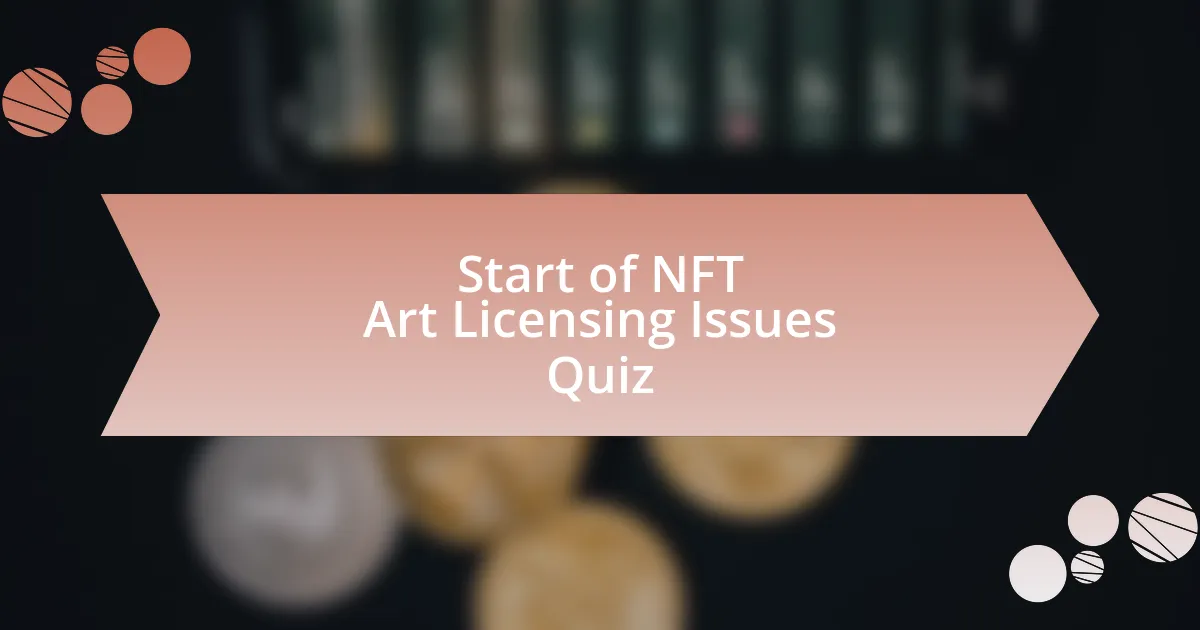
Start of NFT Art Licensing Issues Quiz
1. What is the primary concern regarding NFTs and copyright?
- The transparency of transactions.
- The risk of copyright infringement.
- The management of smart contracts.
- The regulation of digital currencies.
2. What happens if an NFT is created without the copyright owner’s permission?
- The NFT becomes untransferable.
- The NFT is worthless.
- It is automatically deleted.
- Infringement has occurred.
3. Who owns the copyright for the work represented by an NFT?
- The platform that sells the NFT.
- The NFT creator, not the copyright owner.
- The copyright owner, not the NFT buyer.
- The last buyer of the NFT.
4. Can the buyer of an NFT use the work commercially without infringing on the artist’s copyright?
- Yes, always permitted by default.
- No, unless additional licensing options are granted.
- Yes, if they hold a physical copy.
- No, only if the artist allows it.
5. What rights are typically granted to the buyer of an NFT?
- Rights to alter the original artwork without permission.
- Rights to resell the NFT without any restrictions.
- Rights to display, copy for incidental purposes, and create derivative works, but not necessarily commercial exploitation.
- Rights to use the work for unlimited commercial gain.
6. How do platforms address potential copyright infringement issues?
- Platforms like OpenSea invite rights holders to submit complaints and will take down works in response to formal infringement claims.
- Platforms ignore reports of infringement unless the original artist requests action.
- Platforms review all user content and approve it before listing.
- Platforms automatically grant copyright to NFT buyers without conditions.
7. Who can sue for copyright infringement related to an NFT?
- The artist or original copyright owner.
- The buyer of the NFT.
- Anyone who views the NFT.
- The platform that sells the NFT.
8. What are the implications if an artist creates digital works based on an original work under an employment arrangement?
- The employer owns the copyright and the right to create derivative works.
- The copyright is shared equally between the artist and employer.
- The artist retains all rights to the original work and derivatives.
- The employee must get explicit permission from the artist for all uses.
9. What statute protects visual artists` rights in their work?
- The 1990 Visual Artists Rights Act
- The 2010 Copyright Improvement Act
- The 1985 Digital Rights Act
- The 1976 Fair Use Preservation Act
10. Can an NFT be used to attribute a work to the artist?
- Yes, they can replace traditional copyright claims.
- Yes, but it must comply with the Visual Artists Rights Act.
- No, NFTs cannot represent any ownership.
- No, an NFT only represents a digital token.
11. What are the risks associated with minting an NFT?
- The seller is protected from any legal issues during minting.
- Only the buyer`s rights are at risk during the minting.
- Risks include minting the wrong NFT or omitting information.
- Minting an NFT is always risk-free if done properly.
12. Who maintains the blockchain and is responsible for policing it?
- The government agency overseeing digital currencies.
- The users who generate the NFTs.
- Independent auditors hired by the creators.
- The platform or designated entity responsible for maintaining the blockchain.
13. What happens if the platform fails to police the blockchain?
- Users will automatically gain more rights to the NFTs.
- Potential infringement claims and legal action.
- The platform will experience no consequences.
- The blockchain will self-correct and maintain order.
14. Are there any specific laws governing the sale of an NFT?
- There are strict federal laws governing all NFT sales.
- NFTs are completely unregulated by any law or guideline.
- NFTs are treated the same as physical goods under all circumstances.
- Uncertainties exist, with UCC Article 2 sometimes applied by analogy, but state common law and express contract terms often override these provisions.
15. How should platforms address artist-imposed future resale royalties?
- Platforms should manually process royalties after each sale.
- Platforms should include terms in agreements to pay resale royalties.
- Platforms should ignore artist requests for royalties entirely.
- Platforms should charge artists a fee for future royalties.
16. Is the collection of resale royalties handled by the platform or blockchain?
- The collection of resale royalties is reliant on manual processing by artists.
- The collection of resale royalties is managed by a government agency.
- The collection of resale royalties is facilitated through traditional banks.
- The collection of resale royalties is automatically handled by the blockchain.
17. How does an artist know when a transfer has occurred and thus a payment is due?
- The artist is notified automatically by the blockchain.
- The artist receives an email from the buyer.
- The artist waits for monthly payments from the marketplace.
- The artist checks the sales manual regularly.
18. What commercial laws apply to the sale of an NFT?
- Only copyright laws apply, without regard for commercial implications.
- All NFT sales are governed by international trade agreements and treaties.
- Principles of good faith, fair dealing, conscionability, and commercial reasonableness are applied to avoid unfair results.
- Consumer protection laws exclusively govern NFT sales and transactions.
19. In the event of a dispute over an NFT, can the current owner pursue the artist rather than the sales platform?
- No, only the sales platform can be pursued.
- Yes, the current owner can pursue the artist.
- Yes, but only if the NFT is stolen.
- No, all disputes must go through the blockchain.
20. What are the implications of NFTs on copyright law?
- NFTs do not change the operation of copyright; the underlying work is protected by copyright, which can be retained or transferred.
- NFTs grant full ownership of the underlying work to the buyer.
- NFTs allow anyone to use the underlying work as they please without restrictions.
- NFTs automatically eliminate all copyright issues related to the digital work.
21. Does a smart contract need to specify who owns the copyright if a platform mints an NFT of digital art?
- No, it`s not necessary to specify ownership.
- Yes, but only for physical art.
- No, only artistic intent needs to be specified.
- Yes, it should specify who owns the copyright.
22. Who needs permission to display an NFT image for public viewing?
- The platform typically needs permission from the copyright holder of the underlying work, not the owner of the NFT.
- The artist always needs permission from the platform.
- The NFT buyer needs permission from other collectors.
- Anyone can display it without permission.
23. Can an artist license their rights exclusively to the NFT owner?
- Yes, an artist can license their rights exclusively to the NFT owner.
- No, artists cannot license any rights.
- Yes, but only if the platform consents.
- No, the NFT owner has no rights.
24. What rights should be protected from the purchaser of an NFT if the artist plans to create derivative works or reproductions?
- Rights to create derivative works and commercially exploit the artwork should be protected.
- Rights to destroy the original artwork at will.
- Rights to sell the original artwork without restrictions.
- Rights to alter the artwork`s original content freely.
25. What are the implications of using Creative Commons licenses with NFTs?
- Creative Commons licenses restrict all use of the artwork linked to the NFT.
- Creative Commons licenses automatically grant full copyright ownership of the NFT to the buyer.
- Creative Commons licenses can be used to share or give away all rights to the artwork linked to the NFT.
- Creative Commons licenses have no effect on the rights associated with NFTs.
26. How should license terms be designed for NFTs?
- License terms should consider rights to display, copy for incidental purposes, create derivative works, and commercially exploit the artwork.
- License terms should restrict all commercial use of the artwork.
- License terms should grant full ownership rights to the NFT buyer.
- License terms should not address any rights related to the artwork at all.
27. What are the risks associated with transferring an already minted NFT?
- Transferring NFTs guarantees copyright transfer.
- All sales are final and cannot be contested.
- Risks include hacking, theft, and counterfeiting.
- Transferring NFTs is entirely risk-free.
28. Can an NFT be used to enforce terms or prosecute breaches for first or subsequent sales?
- Yes, but only for the first sale, not subsequent sales.
- No, NFTs are not legally binding for any sales.
- No, they cannot enforce any terms or prosecute breaches.
- Yes, but assurances must be given to identify purchasers to enforce terms.
29. Are union rules implicated in NFT sales?
- No, union rules have no bearing on digital art sales.
- Yes, but only for physical art pieces, not NFTs.
- No, union rules are irrelevant to any sales process.
- Yes, union rules like SAG-AFTRA Basic Agreement Par. 22A might be implicated.
30. Can NFT cash flows be implicated in sanctions placed on persons related to the Russian Federation?
- No, NFT cash flows cannot be implicated in sanctions.
- Only physical assets can be implicated in sanctions.
- Sanctions only apply to traditional banking transactions.
- Yes, NFT cash flows could be implicated in sanctions.

Congratulations! You’ve Successfully Completed the Quiz
Thank you for participating in our quiz on NFT Art Licensing Issues. We hope you found the process enjoyable and informative. Engaging with this topic helps illuminate the complexities involved in the rapidly evolving world of digital art. You may have learned about the importance of understanding copyrights, licenses, and the various rights of creators and collectors in the NFT space.
As you reflect on what you’ve learned, consider how these insights can impact your own approaches to NFT art. It’s crucial to navigate these issues with awareness. Recognizing the implications of licensing can enhance your experience as an artist or collector. This knowledge can help you make informed decisions that protect your rights and investments.
To further expand your understanding of NFT Art Licensing Issues, we invite you to explore the next section of this page. Here, you will find additional resources and in-depth articles that dive deeper into these topics. Continuously learning about these issues will empower you in the evolving landscape of NFT art. Happy learning!
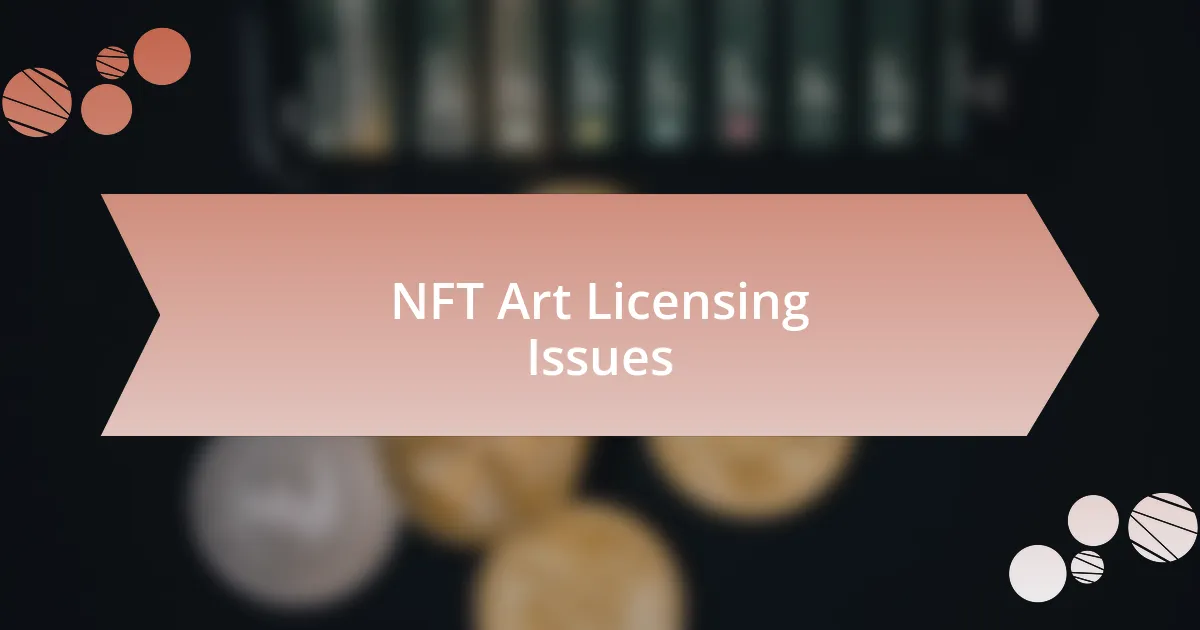
NFT Art Licensing Issues
Understanding NFT Art Licensing
NFT art licensing refers to the legal agreements that govern the use and rights associated with digital artwork sold as non-fungible tokens (NFTs). These licenses specify what the buyer can and cannot do with the artwork. Typical rights may include display rights and resale permissions. Unlike traditional art, where ownership often implies copyright, NFTs can complicate this relationship. The creator usually retains certain rights unless explicitly transferred, making the licensing terms crucial for both artists and buyers.
Types of Licenses in NFT Art
Challenges in NFT Art Licensing
The Role of Smart Contracts in NFT Licensing
What are the main licensing issues associated with NFT art?
The main licensing issues associated with NFT art include copyright infringement, ownership rights, and the limitations of usage rights. These issues arise because NFTs represent ownership of digital assets but do not automatically confer copyright. For example, if an NFT is sold without transferring copyright, the purchaser may not have the right to reproduce or publicly display the artwork. This creates confusion about what buyers can legally do with their acquired NFTs.
How can artists protect their rights in NFT sales?
Artists can protect their rights in NFT sales by clearly defining the terms of use and licensing agreements associated with their NFTs. This includes specifying whether the sale includes copyright transfer or just a license to view or display the artwork. Additionally, artists can register their works with copyright offices, which serves as a legal record of ownership and can strengthen their position in disputes.
Where can NFT creators find guidance on licensing issues?
NFT creators can find guidance on licensing issues through legal professionals who specialize in intellectual property and digital arts, online resources from copyright organizations, and community-driven platforms offering educational content. Websites like the Copyright Office provide useful information. Furthermore, many NFT marketplaces give detailed guidelines on licensing to help creators navigate these complexities.
When do licensing issues typically arise in NFT transactions?
Licensing issues typically arise during the sale and transfer of NFTs when the terms of ownership and rights are unclear or miscommunicated. This can occur at the moment of purchase if the buyer assumes they have copyright control when, in reality, they may only possess a limited license. Disputes can also arise post-sale if the artwork is used in ways not permitted by the original terms.
Who is responsible for addressing licensing issues in the NFT space?
The responsibility for addressing licensing issues in the NFT space usually falls on both the creator and the buyer. Creators must provide clear licensing information and ensure their terms are well-defined. Buyers must educate themselves about their rights and obligations. Additionally, NFT platforms often have a role in facilitating transparent transactions and offering resources to help users understand licensing implications.

